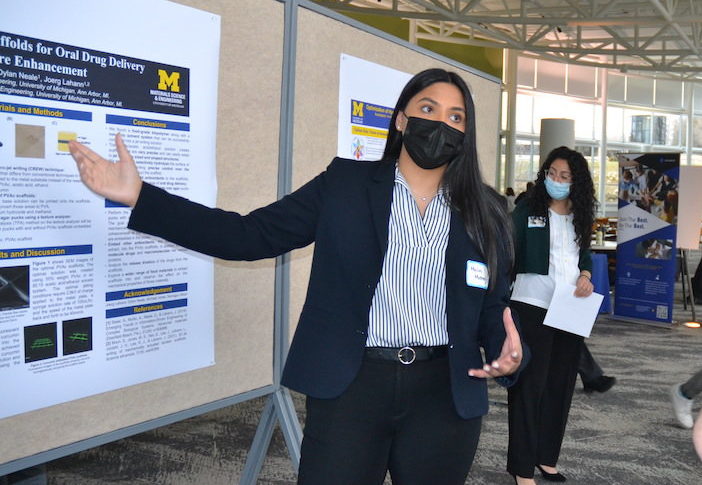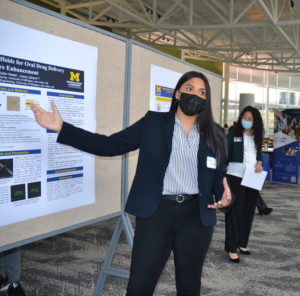
A transformational experience — Malini Mukherji
One of chemical engineering’s newest alumni and recent NSF-GRFP recipient, Malini Mukherji, had a transformational experience at U-M through learning, research and leading the ChE honor society.

One of chemical engineering’s newest alumni and recent NSF-GRFP recipient, Malini Mukherji, had a transformational experience at U-M through learning, research and leading the ChE honor society.
Malini Mukherji, a recent senior in chemical engineering and material science and engineering, was awarded a National Science Foundation Graduate Research Fellowship (NSF-GRFP) this spring. She will begin a PhD program in bioengineering at Harvard University this fall where her research will focus primarily on drug delivery in addition to tissue engineering and regenerative medicine.

“My Michigan experience has been a transformational one,” Mukherji said. “Not only did I receive a rigorous academic education, but I was also able to be heavily involved in research in an internationally renowned research lab, expand my leadership skills through various organizations, and interact with an incredibly diverse student body.”
Mukherji decided to enroll in chemical engineering after working on a Summer Undergraduate Research in Engineering (SURE) project in the Lahann Lab at the Biointerfaces Institute – led by the Wolfgang Pauli Collegiate Professor of Chemical Engineering, Joerg Lahann who serves as director of the institute.
After enrolling in materials science, Mukerji decided to enroll in chemical engineering and undertake a dual degree after she realized how instrumental chemical engineering would be in doing biomedical research. She also wanted to learn the different approaches chemical engineers and material scientists use to problem solve.
Mukherji has conducted research in the Lahann Lab for the past 3.5 years, finishing up in summer 2022 after her final undergraduate semester. Working in an interdisciplinary student team, she helped advance 3D jet writing to create unique polymer scaffold geometries that control the deposition of the extracellular matrix with precisely controlled compositions of key extracellular matrix proteins. The result is a promising technology for tissue engineering applications, with a specific focus on the replication of the extracellular matrix to study and improve the treatment of breast cancer, cardiovascular disease and brain cancer.
Recently, she has been studying tumor-associated collagen signatures (TACS) as a platform for high throughput expansion of patient cells for personalized drug screening and precision medicine.
“I have had many talented students in my group, but rarely do I meet an undergraduate student who has the maturity, research intuition, and work ethics displayed by Malini,” said Lahann.
“I have had many talented students in my group, but rarely do I meet an undergraduate student who has the maturity, research intuition, and work ethics displayed by Malini.”
Joerg Lahann
Wolfgang Pauli Collegiate Professor of Chemical Engineering
Mukherji presented her work at the Undergraduate Research Symposium in March based on research she started during her freshman year on the translation of the techniques the Lahann Lab uses to create polymeric scaffolds for tissue engineering to the area of food engineering.
“As I worked on this project, I realized that the scaffolds could be loaded with antioxidants—showing the potential for the use of polymeric scaffolds as drug delivery systems,” she says. “As drug delivery vehicles, our scaffolds can help in the area of personalized medicine through the creation of customizable medication pills or chemotherapy-drug-loaded grafts implanted after surgical removal of tumors during cancer treatment, for example.”
This project is what inspired her NSF-GRFP proposal and her interest in the combination of drug delivery and tissue engineering—the research she will be focusing on in her doctoral studies.
As president of OXE (Omega Chi Epsilon), the ChE honor society during her senior year, she worked to rebuild the OXE community and its member base, facilitated closer contact and discussion between the undergrads and industrial and academic speakers, and expanded the organization’s STEM outreach impact by building a partnership with G.R.O.W. Tutoring, an organization focused on improving STEM knowledge and literacy for underprivileged K-12 students.
“I will always remain grateful to the ChE department for providing me with such a close-knit cohort of students from which I have made some of my closest friends, allowing me to work closely with a wonderful group of students and faculty for the past four semesters as an instructional aide for the core ChE courses, and providing me with an incredible group of professors whose teaching, support, and mentorship will remain foundational for all of my future academic endeavors. These people and experiences have been key in motivating me to pursue a career in academia and become a professor.”